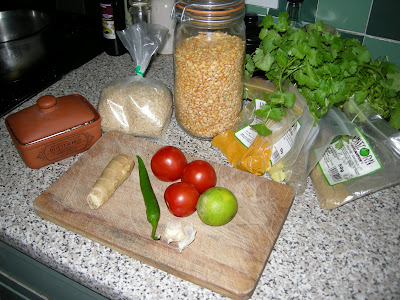As I say, hitting India changed matters and pointing and ordering became a safe bet. Even so, some dishes I knew already, such as dal or dahl, which are legumes. Chana dal is yer chickpeas, masoor dal yer red lentils and there a host of others. Before I left home I'd had a good red lentil curry recipe ("slurry curry") anyway but I tried a dal tadka somewhere in Rajasthan and it was fantastic, both flavoursome and ideal for restocking the carbs and protein after a day of cycling, so I had to make it on my return.
Whilst there I got the impression it was basically a lentil dish made with cumin seeds with a fried dried chilli on top but when on my return to the UK I started looking into it there's more to it than that. Whilst you might think that tadka is like a Tarka but 'otter, it actually refers to cooking the spices and flavourings for a dish separately in ghee and then adding them into the main dish.

Some of the ingredients take a pre-show bow
Ingredients serves two hungry people.
Cooking time 20 minutes to 50 minutes.
- 125g yellow split peas (or red lentils, see below), about 1 mugs worth (still not got scales so this is a guess)
- Tsp turmeric
- Tsp ground coriander
- 30g butter (1/8 of a block)
- 2 tsp cumin seeds (jeera in Hindi)
- 1" fresh ginger, minced
- 1/2 green chilli de-seeded and chopped
- 2 cloves garlic, crushed
- 1/2 tsp asafoetida (hing in Hindi)
- two or three tomatoes (depending on size), diced
- Juice of half a lime
- Handful of coriander leaves (cilantro in US English)
When the dal still has five minutes or so to go heat up your butter (or ghee if you've got it) until it's foaming then add the cumin seeds and fry them for a couple of minutes. If you've got any mustard seeds hanging about you could replace one of tsps of cumin with them.
Next add the ginger, chilli (add more if you like it hot), garlic and hing if you've got it. Cook for another minute or so then add the toms and give it another couple of minutes.

Making the tadka
Add the tadka mix to your cooked dal, squeeze the lime in, stir and give it a minute or so on the heat.
Serve topped with the coriander and roti or basmati rice. Or any other rice will do, won't it?
Ingredient notes
I used the yellow splits for this recipe as I initially thought that that was I'd been having in India. That and I've got jar of them hanging around that need using up. However, on investigation it seems that what I had in India were actually yellow pigeon peas, or toor dal. Still got those split peas to use up though so I went with them anyway and they worked.
Lentils are great though, 26% protein, full of iron with red lentils being a native of the fertile crescent and as such one of mankind's first food crops. I'd recommend Jared Diamonds Guns, Germs and Steel at this point as a cracking good read with some interesting stuff on this sort of thing. Mix lentils with a grain such as rice and you've got a complete protein food (all essential amino acids there in the quantities you need).
Hing, which is easier to spell than asafoetida, is a very pungent spice that adds a kind of garlicky onion taste. It's also reputed to reduce flatulence from lentils which is why I'd recommend it for this dish. If you do get some be sure to store it in an airtight container so it doesn't contaminate other foods you store it with, it really does smell. If you don't have any and don't really fancy getting any either just omit it or try starting the tadka by frying up an onion for ten minutes. Fact lifted straight from wikipedia "In India, industrial cooking gas sold in metal containers is often scented with asafoetida. The scented gas has a distinctive strong sulphurous, garlic like odour which helps to detect any possible leakage of gas quickly". Cool.
When it comes to the chilli, this recipe is underpowered as Helen doesn't like spice. I do so I just sliced up the rest of the chilli and put it over the top of mine. Also, if you have any reasonable sized dried chillies you could try cutting it in half and quickly frying it (for a minute?) separately then putting it on the top of each prepared dish.


He may have crazy hair, but Jared Diamond is great.
ReplyDeleteA word of warning to anyone adding mustard seeds to a hot pan - cover the pan when not stirring (and even while you are if possible) as they tend to eject themselves explosively.